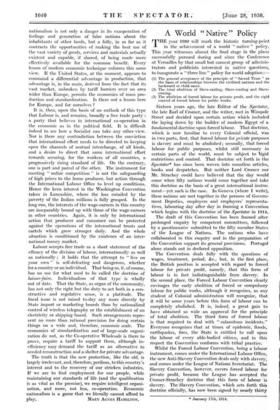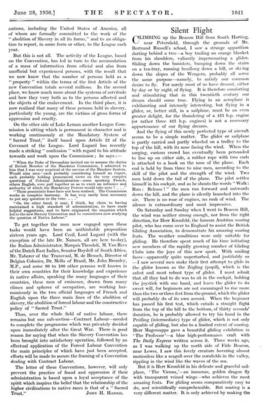A World "Native" Policy
THE year 1930 will mark the historic turning-point in the aohievenient of a world " native " policy. This year witnesses almost the final stage in the plans successfully pursued during and since the Conference at Versailles by that small but earnest group of adminis- trators and publicists interested in native questions, to inaugurate a " three line " policy for world adoption :-
(1) The general acceptance of the principle of " Sacred Trust" as the basis of relationships between the civilized nations and the . backward or child races.
(2) The total abolition of Slave-raiding, Slave-trading. and Slave. owning.
(3) The abolition of forced labour for private profit, and the rigid control of forced labour for public works.
Sixteen years ago, the late Editor of the Spectator, the late Earl of Cromer, and the writer, met in Wimpole Street and decided upon certain action which included the laying down by the builder of modern Egypt of a fundamental doctrine upon forced labour. That doctrine, which is now familiar to every Colonial official, was in two parts, first, that forced labour for private purposes is slavery and must be abolished ; secondly, that forced labour for public purposes, whilst still necessary in certain parts of the world, must be subject to ligid restrictions and control. That doctrine set forth in the Spectator* has since been woven into countless articles, books and despatches. But neither Lord Cromer nor, Mr. Strachey could have believed that the day would come when fifty nations would come together and take this doctrine as the basis of a great international instru meat—yet such is the case. In Geneva (where I write), these nations are met together in the persons of Govern.. ment Deputies, employers and employees' representa- tives, labouring day after day in framing a Convention which begins with the doctrine of the Spectator in 19144 The draft of this Convention has been framed after prolonged enquiry by competent committees, followed by a questionnaire submitted to the fifty member States of the League of Nations. The nations who have collaborated in this enquiry and in the preparation of the Convention support its general provisions. Portugal alone stands out in declared opposition.
The Convention deals fully with the questions of wages, treatment, period, &c., but, in the first place, the British position is accepted with regard to forced labour, for private profit, namely, that this form of labour is in fact indistinguishable from slavery. In the second place, the Forced Labour Convention clearly envisages the early abolition of forced or compulsory labour for public works, although it recognizes, as any student Of Colonial administration will recognize, that it will be some years before this form of labour can be completely abolished. It is, indeed, a great gain to have obtained so wide an approval for the principle of total abolition. The third form of forced labour is that ' required to deal with "calamitous incidents." Everyone recognizes that at times of 'epidemic, floods, earthquakes, fires, the State is entitled to call upon the labour of every able-bodied citizen, and in this respect the Convention conforms with tribal practice.
Whilst the Forced Labour Convention, being a labour instrument, comes under the International Labour Office, the new Anti-Slavery Convention deals only with slavery; and comes under the League of Natio/IS-Secretariat. The Slavery Convention, however, covers forced labour for private profit, because the League has accepted the Cromer-Strachey doctrine that this form of labour is slavery. The Slavery Convention, which sets forth this doctrine officially, has now been ,signed by- nearly thirty
* January 17th, 1914.
nations, including the United States of America, all of whom are formally committed to the work of the "abolition of Slavery in all its forms," and to an obliga- tion to report, in some form or other, to the League each year.
But this is not all. The activity of the League, based on the Convention, has led in turn to the accumulation of a mass of information from official and also from unofficial but experienced persons, with the result that we now know that the number of persons held as a " property " within the terms of the first Article of the new Convention totals several millions. In the second place, we know much more about the systems of servitude and how they vary both as to the persons affected and the objects of the enslavement. In the third place, it is now realized that many of these persons held in slavery, particularly the young, are the victims of gross forms of oppression and cruelty.
On the other side of Lake Leman another League Com- mission is sitting which is permanent in character and is working continuously at the Mandatory System of "Sacred Trust," itself based upon Article 22 of the Covenant of the League. Lord Lugard has recently made a striking " confession " with regard to his attitude towards and work upon the Commission ; he says :— "When the Duke of Devonshire invited me to assume the duties of British Member of the Mandates Commission, I admitted to him that I was very sceptical of the success of the Mandate System. Would nine men—each probably considering himself an expert, each probably holding pronounced views on the very complex questions of Colonial Administration—some speaking -French, others English, ever pull together so as to exert an influence and authority of which the Mandatory Powers would take note ? . . ."
"These pessimistic fears have not been realised. The Commission works in complete harmony. It has very, rarely been necessary to put any question to the vote. . . ."
" On the other hand, it may, I think, lay claim to having maintained a high standard of administration, to have made helpful suggestions, and to have originated the enquiries which led to the new Slavery Convention and to committees now studying the question of Native Labour."
To get together the men now 'engaged upon these tasks would have been an unthinkable proposition sixteen years ago. Lord Cecil, Lord Lugard (with the exception of the late Dr. Nansen, all are here to-day), the Italian Administrator, Marquis Theodoli, M. Van Rees of the Dutch East Indies, Senator Boydell Of South Africa, Mr. Taberer of the Transvaal, M. de Heusch, Director of Belgian Colonies, Dr. Mello of Brazil, Mr. John Bromley, M.P., and some 80 to 100 other persons well known in their own countries for their knowledge and experience in native affairs, speaking the many languages of their countries, these men of eminence, drawn from many climes and spheres of occupation, are working har- moniously in the two official languages of French and English upon the three main lines of the abolition of slavery, the abolition of forced labour and the constructive policy of "Sacred Trust."
Thus, over the whole field of native labour, there remains but one sub-section—Contract Labour—needed to complete the programme which was privately decided upon immediately after the Great War. There is good reason for saying that when the Slavery Convention has been brought into satisfactory operation, followed by an effectual application of the Forced Labour Convention the main principles of which have just been accepted, efforts will be made to secure the framing of a Convention dealing with Contract Labour.
The letter of these Conventions, however, will only prevent the practice of fraud and oppression if their administration is based upon a loyal acceptance of the spirit which inspires the belief that the relationship of the higher civilizations to native races is that of a "Sacred



















































 Previous page
Previous page